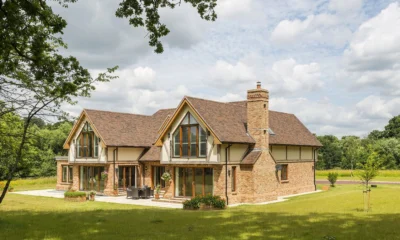Home Insurance
Building Insurance in the UK

Understanding Building Insurance
Building insurance covers the physical structure of your home, protecting against risks such as fires, storms, vandalism, and subsidence.
What Does Building Insurance Cover?
✔ Structural Damage – Walls, roofs, windows, and fitted kitchens. ✔ Pipes & Wiring – Protection against water leaks and electrical faults. ✔ External Structures – Some policies cover garages, sheds, and driveways. ✔ Alternative Accommodation – Covers temporary housing costs if your home is uninhabitable.
Who Needs Building Insurance?
- Homeowners – Required for mortgage approval.
- Landlords – Protects rental properties.
- Leaseholders – Some buildings insurance is covered by management companies.
How to Choose the Right Policy
- Compare quotes from trusted insurers.
- Check if your policy covers accidental damage.
- Ensure flood and fire protection are included.
References:
Home Insurance
Contents Insurance in the UK

Why Contents Insurance is Essential
Contents insurance protects personal belongings inside your home from theft, fire, flooding, and accidental damage.
What Does Contents Insurance Cover?
✔ Furniture & Appliances – Sofas, beds, fridges, and TVs. ✔ Electronics & Gadgets – Laptops, smartphones, and gaming consoles. ✔ Jewelry & Valuables – High-value items like watches and art. ✔ Clothing & Personal Items – Everyday essentials.
Additional Coverage Options
- Accidental Damage: Covers spills and breakages.
- Out-of-Home Cover: Protects items taken outside the house.
- New-for-Old Cover: Replaces lost items with brand-new ones.
How to Get the Best Contents Insurance Deal
✔ Take an inventory of valuable items.
✔ Choose the right coverage level based on belongings.
✔ Compare policies online for the best rates.
References:
Home Insurance
Homeowners Insurance in the UK

What is Homeowners Insurance?
Homeowners insurance protects your home against damage, theft, and unforeseen risks. It ensures financial security by covering repair costs, liability claims, and other unexpected expenses.
Types of Homeowners Insurance
- Buildings Insurance – Covers the structure of your home, including walls, roofs, and permanent fixtures.
- Contents Insurance – Protects personal belongings inside your home, such as furniture, electronics, and valuables.
- Combined Home Insurance – Includes both buildings and contents insurance in a single policy.
Why Do You Need Homeowners Insurance?
✔ Mortgage Requirement: Lenders often require homeowners insurance. ✔ Financial Protection: Covers unexpected damages from fire, floods, and theft. ✔ Peace of Mind: Knowing your home and valuables are secure.
References:
Home Insurance
Ultimate Guide to Home Insurance in the UK

Introduction
Your home is one of your most valuable assets, so protecting it with the right home insurance is essential. Whether you’re a homeowner, landlord, or tenant, having a reliable policy in place safeguards you against unexpected damages, theft, or natural disasters. In this guide, we’ll break down the different types of home insurance, what affects the cost, and how to find the best deal in the UK.
Types of Home Insurance
1. Buildings Insurance
- Covers damage to the structure of your home, including walls, roof, and floors.
- Required by mortgage lenders if you have a mortgage on your property.
- Protects against risks like fire, floods, storms, and subsidence.
2. Contents Insurance
- Covers personal belongings inside your home, such as furniture, electronics, and clothing.
- Protects against theft, fire, and accidental damage.
- Some policies offer new-for-old replacement, meaning stolen or damaged items are replaced with brand-new ones.
3. Combined Home Insurance
- A policy that includes both buildings and contents insurance.
- Often cheaper than purchasing separate policies.
- Ideal for homeowners looking for comprehensive protection.
4. Landlord Insurance
- Specifically designed for rental property owners.
- Covers buildings, landlord’s contents (if furnished), and liability claims.
- Some policies include loss of rent cover if tenants can’t stay in the property due to damage.
5. Tenants’ Insurance
- Aimed at renters to protect their personal belongings.
- Covers theft, accidental damage, and loss of valuables.
- Some policies include accidental damage cover for the landlord’s fixtures and fittings.

What Affects Home Insurance Costs?
1. Where You Live
- Homes in high-crime areas usually have higher premiums.
- Properties in flood-prone zones may require specialist insurance, which can be costly.
2. Type of Property
- Detached houses generally cost more to insure than flats.
- Older homes may require specialist insurance due to higher risks of structural issues.
3. Home Security
- Installing burglar alarms, CCTV, and security locks can reduce your insurance premium.
- Smoke detectors and fire safety measures can also lead to discounts.
4. Claims History
- If you’ve never made a claim, you may qualify for a no-claims discount.
- Multiple claims in a short period can increase your premium.
5. Excess Amount
- Choosing a higher voluntary excess can lower your monthly premium.
- A lower excess means you’ll pay less out of pocket if you make a claim, but your premium will be higher.
Best Home Insurance Providers in the UK
When looking for reliable home insurance, consider these top providers:
- Aviva – Comprehensive cover with a solid reputation.
- Direct Line – No broker fees and flexible policies.
- LV= (Liverpool Victoria) – Affordable with excellent customer reviews.
- Admiral – Great for bundling with car insurance for discounts.
- AXA – Ideal for landlords and high-value homes.
Tips to Get the Best Home Insurance Deal
- Compare home insurance quotes on sites like MoneySuperMarket, GoCompare, or CompareTheMarket.
- Increase your voluntary excess to lower your premium.
- Bundle buildings and contents insurance together for a better deal.
- Improve home security with locks, alarms, and cameras to qualify for discounts.
- Pay annually instead of monthly to avoid interest fees.
Common Home Insurance Myths
- “Buildings insurance covers everything” – In reality, you need contents insurance to protect your personal belongings.
- “Renters don’t need insurance” – While your landlord covers the building, you’ll need tenants’ insurance for your own possessions.
- “Cheapest policies are the best” – Always check what’s included, as basic policies may leave out essential coverages.
Conclusion
Having the right home insurance policy is crucial for protecting your home and belongings from unexpected events. Whether you need buildings insurance, contents insurance, or landlord cover, comparing policies and understanding what affects your premium can help you find the best deal. Regularly reviewing your policy ensures you stay covered at the best possible rate.
References
- UK Government Home Insurance Guide: www.gov.uk/home-insurance
- MoneySuperMarket Home Insurance Comparison: www.moneysupermarket.com
- CompareTheMarket Home Insurance: www.comparethemarket.com
-

 Car Insurance3 months ago
Car Insurance3 months agoUltimate Guide to Car Insurance in the UK | Best Providers & Tips
-

 Home Insurance3 months ago
Home Insurance3 months agoUltimate Guide to Home Insurance in the UK
-

 Insurance3 months ago
Insurance3 months agoAre Insurance Payouts Taxable in the UK? A Complete Guide
-

 Car Insurance3 months ago
Car Insurance3 months agoAverage Car Insurance Cost in the UK: A Guide
-

 Car Insurance3 months ago
Car Insurance3 months agoCheap Car Insurance in the UK
-

 Health Insurance3 months ago
Health Insurance3 months agoBest Health Insurance in the United Kingdom – A Complete Guide
-

 Car Insurance3 months ago
Car Insurance3 months agoComprehensive Car Insurance – What You Need to Know
-

 Health Insurance3 months ago
Health Insurance3 months agoHealth Insurance Quotes in the UK







